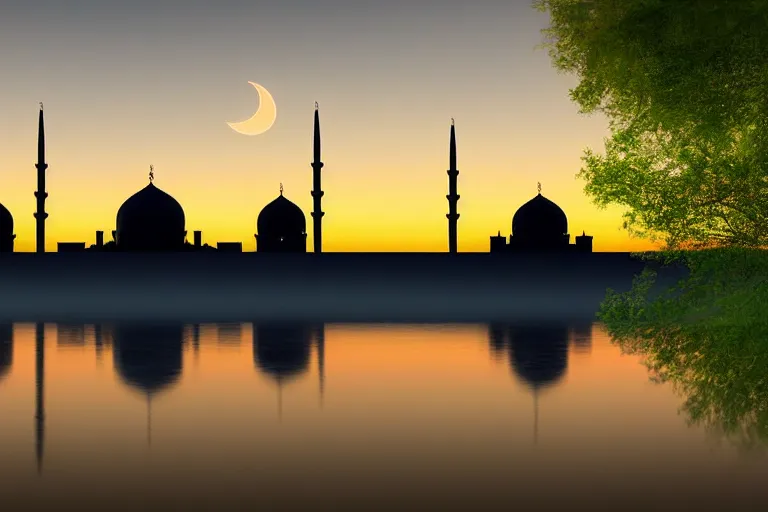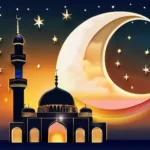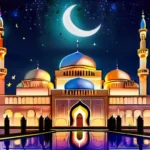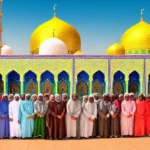Explore the daily practices, spiritual significance, and cultural aspects of Ramadan for Muslims worldwide.
Ramadan is a sacred month in the Islamic calendar, marked by fasting, prayer, and acts of charity. In this article, we delve into the various activities that Muslims engage in during this holy month, shedding light on its spiritual and cultural significance.
The Significance and Importance of Ramadan
Imagine a journey where you venture into the heart of faith, a pilgrimage through the month of Ramadan. What is Ramadan? It’s more than just a calendar month; it’s a profound spiritual experience that transforms lives and communities. In the Quran, Allah (God) says:, “O you who believe, fasting has been prescribed for you as it was prescribed to those before you, so that you may learn self-restraint.” This verse encapsulates the essence of Ramadan—a time when Muslims strive to build character and deepen their connection with the divine.
Historically, Ramadan is named after the ninth month in the Islamic lunar calendar. But its significance transcends mere dates on a calendar. It’s a month where the gates of heaven are said to open wide, allowing prayers to be answered more easily. Muslims believe that during this period, angels descend to earth to deliver divine messages and supplications. How could such an extraordinary event pass without marking it with fasting?
The spiritual significance of Ramadan is profound. It’s a time for self-reflection, where the faithful seek forgiveness from Allah through prayer, charity, and abstaining from food and drink from dawn until sunset. By doing so, Muslims hope to purify their souls and come closer to the divine. Is it not true that by fasting, we fast away our sins?
The cultural aspects of Ramadan are equally rich. The month is filled with special meals, called iftar, broken after sunset prayers, and suhoor, a predawn meal before dawn’s light. The spirit of community is evident in the way families and friends come together to break their fasts. Do we not see the warmth of Ramadan’s spirit in the gathering of loved ones around a communal table?
The importance of Ramadan extends beyond religious practices; it’s about nurturing compassion, generosity, and empathy towards others. The month challenges Muslims to live with integrity and kindness, making them better people both spiritually and socially. Can we not see this as a metaphor for the broader world, where such virtues are essential?
In essence, Ramadan is a comprehensive guide to spiritual growth and community building. It’s a reminder of our shared humanity and the divine purpose that binds us together. As the month unfolds, it offers a journey into deeper reflection and self-improvement. How can we ignore such an opportunity for personal and communal renewal?
The spiritual significance of Ramadan is not just about following religious rituals but also about the transformative power of intention and commitment. It’s a reminder that every act of worship, however small, can have a profound impact on our lives and the world around us.
Fasting During Ramadan: A Daily Practice
Imagine embarking on a journey where every day feels like climbing a mountain, but instead of physical exertion, it’s spiritual discipline that propels you forward. Fasting during Ramadan is more than just abstaining from food and drink; it’s a profound act of devotion and self-discipline. Why do Muslims fast during Ramadan? It’s about cleansing the soul, strengthening faith, and remembering the plight of those less fortunate.
Fasting during Ramadan follows strict rules to ensure spiritual purity and discipline. The primary purpose is to emulate the condition of Prophet Muhammad (PBUH) and his companions who fasted with him in the early days of Islam. By abstaining from dawn till dusk, Muslims experience hunger and thirst, which serve as reminders of the poor and needy.
Each day begins with a light breakfast called Suhur, eaten just before the first call to prayer at dawn. It’s like packing a lunch for a long hike; you need sustenance to keep going. Then comes the fast, a period of intense focus on worship and self-reflection. As the sun sets, families gather around tables brimming with delicious iftar meals, breaking their fasts together.
The rules governing fasting are straightforward yet deep in meaning. One must abstain from food, drink, smoking, and sexual activity during daylight hours. However, the true essence lies in maintaining self-control, sincerity towards God, and seeking forgiveness for past mistakes. Each day of fasting is a step closer to achieving inner peace and spiritual growth.
As Muslims break their fasts each evening, they celebrate not just with food but with gratitude and renewed commitment. The act of breaking the fast symbolizes more than just ending physical hunger; it’s about breaking away from negative habits and sins that can cloud the mind and heart.
Fasting during Ramadan is a holistic experience that touches every aspect of life—physical, emotional, and spiritual. It’s a personal challenge that transforms into a communal celebration as neighbors share iftar meals, and mosques host gatherings for the entire community to break their fasts together. This shared experience strengthens bonds and fosters compassion and empathy.
The Nightly Taraweeh Prayers
As the golden light of sunset fades into the horizon, signaling the start of Maghrib, Muslims across the globe prepare for one of the most enchanting and spiritual practices of Ramadan: the nightly Taraweeh prayers. These prayers are a beautiful metaphor for life’s journey through its ups and downs. Just as these prayers offer solace and comfort during the challenging fasts, they provide guidance and strength throughout the tumultuous path of life.
Imagine a vast sea, gently lapping at the shores of your soul, where each night, you dip into this tranquil water to cleanse and recharge. The Taraweeh prayers, consisting of 10 or more rakats (units of prayer), are like these nightly dips, offering moments of reflection and spiritual rejuvenation.
During Ramadan, the air seems thick with anticipation as families gather in mosques for the communal Taraweeh. The rhythmic recitations of the Quran provide a soothing melody that echoes through the community, binding hearts together. It’s a profound reminder that in this vast world, we are all interconnected, our struggles and triumphs shared by those around us.
But why does the number of rakats change each night? Is it not enough to offer 10 every evening? Could it be that Allah, through these ever-changing numbers, teaches us the value of adaptability and flexibility in our spiritual journey?
The unique aspect of Taraweeh lies in its unstructured nature. While many prayers are fixed, the number of Taraweeh rakats varies each night, adding a layer of surprise and excitement to the nightly ritual. It’s like opening a gift every night during Ramadan – you never know what treasures lie within, just as you might discover new insights or meanings in your prayers.
As the month progresses, these nightly Taraweeh prayers become not just a religious duty but a cherished part of life’s rhythm. They remind us that even in our most challenging moments, there is always hope and solace to be found, much like finding a ray of light amidst the darkest night.
So as you prepare for these special prayers, consider what Taraweeh means to you beyond just recitations. Is it a time for deep introspection? A moment to seek guidance and forgiveness? Or perhaps simply a chance to connect with your community in a meaningful way?
The beauty of Ramadan lies not only in its fasting but also in the myriad practices that enrich our spiritual lives, including these nightly Taraweeh prayers. They are a reminder that even in the silence of night, God is always listening, and His light guides us through every shadow.
Charity and Generosity During Ramadan
Imagine walking into a bustling market early in the morning on a Ramadan day, where every stall and stallholder seems to be offering more than just goods—they’re giving out blessings and kindness. This is one of the many ways Muslims demonstrate their commitment to charity and generosity during this holy month.
During Ramadan, the act of giving extends beyond financial donations; it’s about sharing meals, providing food for those in need, and volunteering time and effort. By giving, Muslims believe they are purifying their souls and strengthening their faith. This is not just a personal practice but also a communal one that fosters a sense of togetherness.
The act of charity during Ramadan can be as simple as sharing an extra meal with a neighbor or donating to a local food bank. Many mosques organize iftar kitchens, where volunteers prepare and serve free meals to the community. These kitchens are more than just places for food; they symbolize the warmth and support of the Muslim community, much like a blanket that covers everyone in its embrace.
By engaging in these acts of kindness, Muslims not only fulfill their religious obligations but also create a ripple effect of positivity. Every act of charity during Ramadan is a step towards breaking down barriers between people and fostering understanding and empathy. It’s about recognizing the value of each individual and working together to build a more compassionate world.
Breaking the Fast: Iftar Traditions
As the sun begins its descent, signaling the end of another fast, Muslims around the world eagerly anticipate Iftar. This ritual breaking of the fast is more than just a meal; it’s a profound act of thanksgiving and community. Imagine, for a moment, the scene unfolding as families gather around a table set with dates, water, and traditional dishes.
Why do we break our fasts with dates? Is it merely because they’re rich in nutrients? Not quite. The Prophet Muhammad (peace be upon him) himself began his iftar with dates, making them symbolic of a spiritual nourishment that goes beyond physical sustenance. Dates are believed to have been the first food provided by God to restore energy and calm the soul.
The breaking of fast is also a time for gratitude. As we break our fasts, do we pause to reflect on why we fast in the first place? Fasting during Ramadan is not just about abstaining from food and drink; it’s a journey of self-purification, a period when we seek closeness with God. By breaking the fast, we reaffirm our commitment to these spiritual goals.
But Iftar is more than a personal experience. It’s a communal event that strengthens bonds within families and communities. Iftar gatherings can be found in mosques, homes, and community centers, where people come together not just for food but for fellowship. These meals are not just about breaking the fast; they’re about breaking bread and building bridges.
As we savor each bite, do we truly appreciate the effort that goes into preparing these feasts? From the mother who rises early to cook before dawn until late into the night, to the volunteers who set up tables and serve food, Iftar is a celebration of love and service. It’s a reminder that our community is stronger when we come together to share both burdens and blessings.
So, as you prepare for Iftar this year, think about more than just the food on your plate. Think about the spiritual significance, the gratitude expressed, and the joy shared with others. For in breaking our fasts, we not only break bread but also break down barriers between hearts and souls.
How will you make Iftar this year a moment of deep reflection and community building?
Eid al-Fitr: Celebrating the End of Ramadan
As Ramadan draws to a close, Muslims eagerly await Eid al-Fitr, a day that marks not just the end of fasting but also the celebration of spiritual triumph and communal unity.
‘How can one truly understand the joy of breaking free from chains without knowing what it feels like to be bound?’
Imagine, if you will, a vast sea of people converging in towns and cities across the world, all united by the same spiritual mission. This Eid al-Fitr is more than just a festival; it’s a profound moment of liberation, where souls shed their spiritual shackles.
The atmosphere during Eid al-Fitr is electric, with vibrant colors, melodious chants, and the warmth of community gatherings. Families prepare special meals, exchange gifts, and visit one another to strengthen familial bonds—a metaphorical basket filled with blessings, shared amongst those in need.
As you walk through the bustling markets, you’ll see families adorned in their finest clothes, their faces aglow with happiness. The Eid prayer at the mosque serves as a powerful reminder of communal unity and gratitude. It’s a time to reflect on the past month of fasting and to renew one’s commitment to Islam.
And so, as you participate in this grand celebration, remember that Eid al-Fitr isn’t just about feasting; it’s about giving back. Many Muslims make donations or offer meals for those who might otherwise go without. It’s a poignant reminder that true blessing lies not in what we accumulate but in how we share.
As the day comes to an end, you can’t help but feel a sense of profound fulfillment. For Muslims around the world, Eid al-Fitr is a beacon of hope and a symbol of resilience, marking the beginning of renewed faith and communal strength. It’s more than just a festival; it’s a journey that binds hearts together in the most beautiful of ways.
How can you not be moved by such an eloquent expression of unity and spiritual renewal?
Conclusion
 By understanding the daily practices and rituals observed during Ramadan, one can gain a deeper appreciation for the Islamic faith and the values it upholds. This article serves as a comprehensive guide to the month of Ramadan, providing insights into the lives of Muslims worldwide.
By understanding the daily practices and rituals observed during Ramadan, one can gain a deeper appreciation for the Islamic faith and the values it upholds. This article serves as a comprehensive guide to the month of Ramadan, providing insights into the lives of Muslims worldwide.











